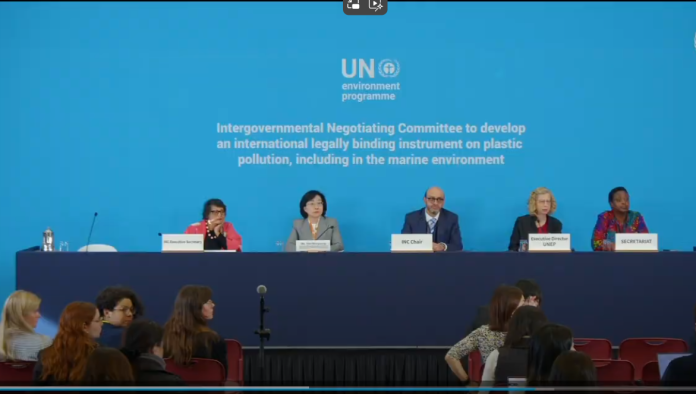
The second part of the fifth session of the Intergovernmental Negotiating Committee (INC-5.2) to develop an international legally binding plastics treaty to combat plastic pollution, including in the marine environment, will take place from 5 to 14 August 2025 at the Palais des Nations in Geneva, Switzerland, the United Nations Environment Programme (UNEP) has announced.
The resumed session will be preceded by regional consultations on 4 August 2025. The first part of the fifth session (INC-5.1), which took place from 25 November to 1 December 2024 in Busan, Republic of Korea, had ended in a stalemate. At the previous negotiations in Busan, leaders agreed that more time was needed to secure a strong plastics treaty.
More than 3,300 delegates – including members representing more than 170 nations and observers from more than 440 organizations had met in Busan.
At INC-5.1. the majority of countries supporting ambitious measures such as plastic reduction targets, elimination of chemicals of concern, a just transition, and an equitable financial mechanism fought back against a small group of petroleum-producing nations that sought to stall and weaken the treaty outcomes, making it clear that they will not bow to petro-state pressure.
The Global South countries led the charge towards ambition, bolstered by civil society groups, frontline communities, Indigenous Peoples, and the scientific community.
According to reports and updates Packaging South Asia had been receiving from various sources in Busan, a sticking point has been the demand from anti-pollution campaigners to cut virgin plastic polymer production, plastic production and to regulate hazardous chemicals – which oil-and gas-producing countries such as Saudi Arabia and Kuwait have been vehemently opposing.
Ana Rocha, Director of Global Plastics Policy at GAIA, states, “The tides turned at INC-5, and the possibility of an ambitious plastics treaty is now more concrete than it’s ever been. At INC-5.2, governments must keep up the momentum and stay strong against fossil fuel interests to deliver the treaty that will keep us below 1.5 degrees.” GAIA is a worldwide alliance of more than 1,000 grassroots groups, non-governmental organizations, and individuals in over 90 countries.
Civil society and negotiators said 103 countries signed in support of a Declaration on Primary Plastic Polymers while 85 countries signed a ‘Standing Up for Ambition’ statement emphasizing their shared commitment to a legally binding treaty enshrining reduction targets, phase-out of harmful chemicals, a just transition, and an equitable financial mechanism. Ninety-four countries signed a Declaration on Plastic Products and Chemicals of Concern while 100 countries signed a text proposal to adopt a plastic production reduction target, GAIA stated.









